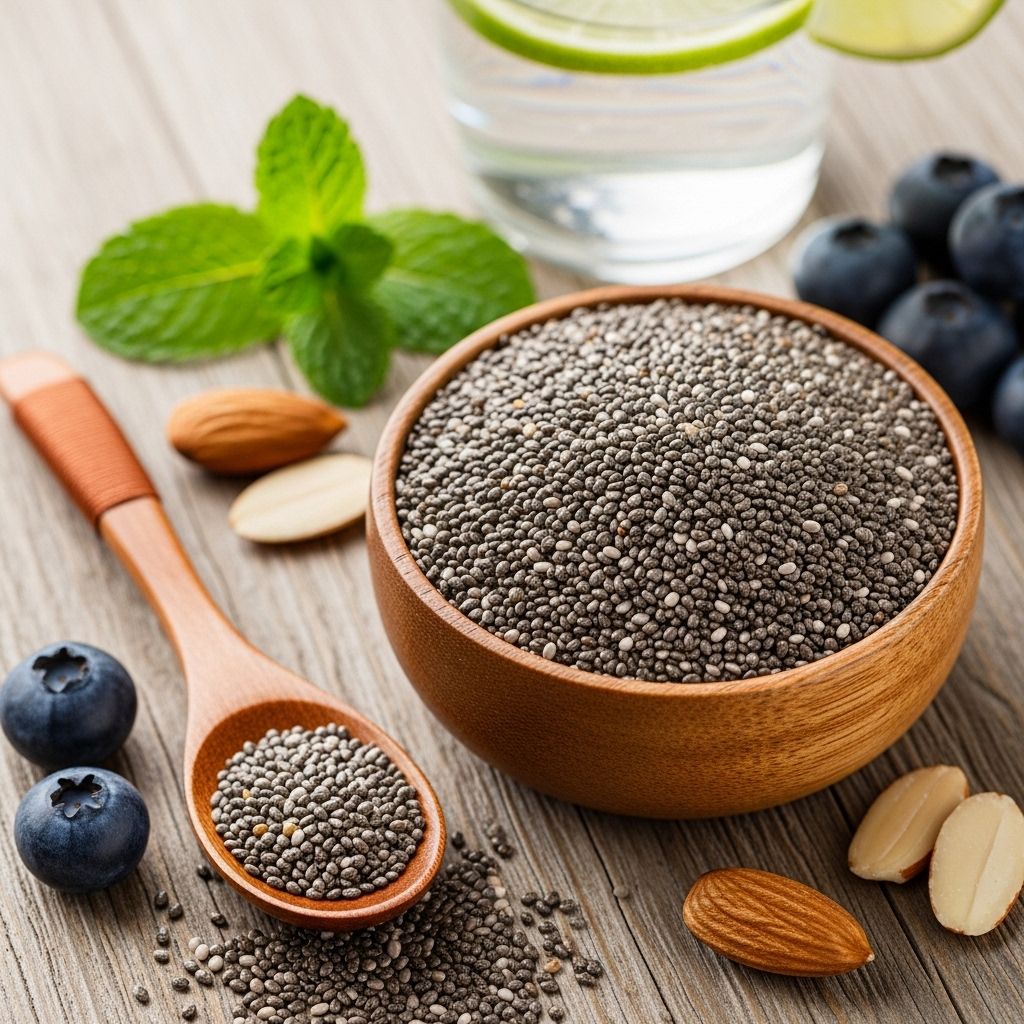Chia Seeds: Unveiling the Evidence-Based Health Benefits and Nutritional Powerhouse
Discover the science-backed health benefits, uses, and nutrition facts of chia seeds.

Table of Contents
n
- n
- Introduction
- Nutritional Profile
- Health Benefitsn
- n
- Heart Health
- Blood Sugar Control
- Weight Loss & Management
- Bone Health
- Anti-Inflammatory Effects
- Skin Health
- Hydration
- Other Potential Benefits
n
n
n
n
n
n
n
n
Related: Unveiling the Powerful Health Benefits of Chia Seeds: Nutrition, Wellness, and Practical Uses
n - How to Incorporate Chia Seeds
- Side Effects & Precautions
- Frequently Asked Questions (FAQs)
- Conclusion
n
n
n
n
n
n
n
n
nn
Introduction
n
Chia seeds (Salvia hispanica L.) have emerged as a modern superfood, celebrated for their remarkable nutritional profile and diverse health benefits. Originating from Central and South America, these tiny seeds were once a staple of ancient Aztec and Mayan diets. Today, they are globally recognized for their high content of omega-3 fatty acids, fiber, protein, antioxidants, and essential minerals. This article delves into the science behind chia seeds, exploring their nutritional composition, proven health benefits, practical uses, and safety considerations.
n
nn
Nutritional Profile
n
Chia seeds are a nutritional powerhouse, packing a significant amount of essential nutrients into a small serving. Here’s a breakdown of their key components per 1-ounce (28-gram) serving:
nn
| Nutrient | Amount (per 1 oz) | % Daily Value |
|---|---|---|
| Calories | 138 | 7% |
| Protein | 4.7 g | 9% |
| Fat (Total) | 8.7 g | 13% |
| Omega-3 (ALA) | 4,915 mg | – |
| Fiber | 9.8 g | 39% |
| Calcium | 177 mg | 18% |
| Magnesium | 95 mg | 24% |
| Phosphorus | 265 mg | 27% |
| Iron | 2.2 mg | 12% |
| Potassium | 115 mg | 3% |
| Antioxidants | High | – |
nn
Chia seeds are also gluten-free and contain all nine essential amino acids, making them a complete plant-based protein source. Their high omega-3 content, primarily in the form of alpha-linolenic acid (ALA), is particularly noteworthy, as the body cannot produce this essential fatty acid and must obtain it through diet.
n
nn
Health Benefits
nn
Heart Health
n
Chia seeds are associated with several cardiovascular benefits:
n
- n
- Lower Cholesterol: Studies show that regular consumption of chia seeds can reduce LDL (“bad”) cholesterol and triglycerides while increasing HDL (“good”) cholesterol. A study involving male Wistar rats found a significant decline in triglycerides and LDL cholesterol after chia seed supplementation.
- Blood Pressure Reduction: Human trials have demonstrated that chia seeds can lower systolic and diastolic blood pressure. In one study, 50 grams per day led to a notable decrease in diastolic blood pressure over 30 days. Another study reported a reduction in systolic blood pressure by up to 6 mmHg.
- Omega-3 Fatty Acids: The high ALA content in chia seeds helps balance the omega-6 to omega-3 ratio, which is crucial for reducing inflammation and protecting against heart disease.
- Antioxidant Protection: Antioxidants like quercetin and caffeic acid in chia seeds help combat oxidative stress, a key factor in the development of heart disease.
n
n
n
n
n
While animal studies are promising, more large-scale human studies are needed to fully confirm these effects.
nn
Blood Sugar Control
n
Chia seeds may play a role in managing blood sugar levels and reducing diabetes risk:
n
- n
- Fiber Content: The soluble fiber in chia seeds absorbs water, forms a gel-like substance, and slows carbohydrate digestion, leading to more stable blood glucose levels.
- Research Findings: A study in Toronto found that 37 grams of chia seeds daily helped stabilize blood glucose in diabetic patients. Adding chia to bread has also been shown to lower the glycemic response compared to regular bread.
- Insulin Sensitivity: Adequate fiber intake is linked to improved insulin sensitivity and a reduced risk of type 2 diabetes.
n
n
n
nn
Weight Loss & Management
n
Chia seeds can support weight management through several mechanisms:
n
- n
- Satiety: The high fiber and protein content promote a feeling of fullness, which may help reduce overall calorie intake.
- Visceral Fat Reduction: Animal studies have shown that chia seed consumption can decrease visceral adiposity (abdominal fat).
- Low-Calorie Density: Despite their nutrient density, chia seeds are relatively low in calories, making them a weight-friendly addition to meals[
References
- https://pmc.ncbi.nlm.nih.gov/articles/PMC4926888/
- https://www.webmd.com/diet/health-benefits-chia-seeds
- https://www.health.harvard.edu/nutrition/chia-seed-benefits-what-you-need-to-know
- https://www.healthline.com/nutrition/11-proven-health-benefits-of-chia-seeds
- https://pmc.ncbi.nlm.nih.gov/articles/PMC9834868/
- https://news.oregonstate.edu/news/new-study-eyes-nutrition-rich-chia-seed-potential-improve-human-health
- https://nutritionsource.hsph.harvard.edu/food-features/chia-seeds/
- https://nutrition.org/real-scoop-chia-seeds/
n
n
Read full bio of Sneha Tete












